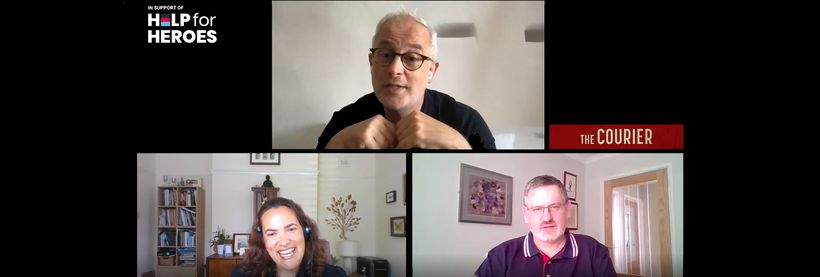Updated on
Dominic Cooke, director The Courier, is a man with a keen interest in engaging and supporting veterans. His interest stems from personal family history; his Grandfather served in the trenches during WWI.
The film follows the real life story of Greville Wynne, a salesman (played by Benedict Cumberbatch) who is recruited as an unlikely spy to gather intelligence from the Russians to defuse the Cuban Missile Crisis.
For Greville, the impact was huge, as after serving his purpose he was left to cope with the aftermath with no support. His life, and that of his wife and son, unravels; ultimately his marriage breaks down and he suffers a colossal nervous breakdown.
Keen to talk more about how those who serve cope when they return to ‘normal life’, Dominic sat down for a chat with Nick Richardson, a Royal Navy veteran we have supported and Sarah Jones, our Head of Psychological Wellbeing at Help for Heroes.
Coping with adjustment disorder
One of the film’s key themes touches on what we now know as ‘adjustment disorder’. Back in the days of WW1, this wasn’t something that was considered when military service came to an end.
After everything Greville goes through, the government washes their hands of him and he has to cope on his own, with no support. “My understanding is [the government] didn’t understand or care much at the time about the effect these things would have on their operatives”, says Dominic.
His subsequent breakdown may have been, in part, due to adjustment order which is common among those we support. As Sarah explains, an adjustment disorder arises when “your trust is within a specific group of people under specific conditions, [and then you’re] thrown into a wider world of having to adjust to a very different set of circumstances.”
Nick himself suffered from mental health issues associated with adjustment disorder after leaving the Navy. While he was eventually able to come to terms with situation, he describes the transition to civilian life as “hideous”.
“When you’ve only known one thing for 20 years, it’s very difficult. And then there’s all the normal stresses of families and mortgages everyone else has to deal with. Even just thinking about medical discharge can still make me feel ill even now,” says Nick.
Veterans have lived in a world where they become conditioned to know exactly what to do, when to do it and what is expected of them, but no-one ‘unconditions’ them when they leave the military – and this is why so many of the veterans we support struggle with the transition to civilian life, with mental health issues often arising from this situation.
Feeling expendable
Once Greville stops being useful, he’s given a pension, but no other support. As Dominic explains, “What we tried to clarify (in the film) was that once there was a risk of Greville being arrested, MI6 were like, ‘We’re not having another one being arrested. We are going to shut this down right now’. And with the escalating crisis around Cuba, the CIA were going ‘we don’t really care, because he’s totally expendable. He’s not even an American, and we’re talking about the annihilation of the planet, so we don’t care’.”
Nick feels a huge amount of sympathy for the way in which Greville was dropped as, for many veterans who go through medical discharge, there can be a real feeling of expendability.
“You do a job, you’re loyal to your service and those around you, and sometimes you fall off the end of a cliff because you can no longer do that job and you’re not always left in a great place to be able to move forward,” he says.
“I certainly didn’t feel I was given a huge amount of help when I left the Armed Forces and it’s taken a long time to get me to this point. It is not easy. Any help you can get, that charities like Help for Heroes can provide, is a good thing.”
The power of fellowship
In making the film, Dominic was keen to understand more about the psychological barriers veterans face when asking for help. As Sarah explains, it often takes a lot of courage for our wounded to admit they need support.
“Encouraging somebody to engage in any kind of process, to even recognise the difficulty within themselves is huge really, it takes an incredible amount of courage. Trust is a huge element,” she says.
Greville’s unique situation meant he had no one one to talk to who had gone through the same situation. “His experience [as a spy] was utterly lonely,” says Dominic.
For wounded veterans, being able to talk to others who understand them is invaluable, which is why our Fellowship groups, The Band of Brothers (which Nick belongs to) and Band of Sisters give them and their families the opportunity to get together and share experiences.
In making the film, Dominic was keen to understand more about the psychological barriers veterans face when asking for help. As Sarah explains, it often takes a lot of courage for our wounded to admit they need support.
“Encouraging somebody to engage in any kind of process, to even recognise the difficulty within themselves is huge really, it takes an incredible amount of courage. Trust is a huge element,” she says.
Greville’s unique situation meant he had no one one to talk to who had gone through the same situation. “His experience [as a spy] was utterly lonely,” says Dominic.
For wounded veterans, being able to talk to others who understand them is invaluable, which is why our Fellowship groups, The Band of Brothers (which Nick belongs to) and Band of Sisters give them and their families the opportunity to get together and share experiences.
You can check out Dominic, Sarah and Nick’s conversation on our YouTube channel



